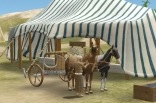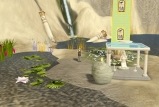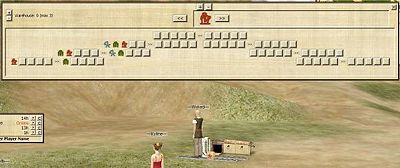The Wiki for Tale 4 is in read-only mode and is available for archival and reference purposes only. Please visit the current Tale 11 Wiki in the meantime.
If you have any issues with this Wiki, please post in #wiki-editing on Discord or contact Brad in-game.
Principles of Thought/fr
 |
Page Principale | Bâtiments | Ressources | Guides | Epreuves | Compétences | Technologies | Cueillette |  |
Initiation à la Pensée
Construire un Jeu de la Main Vide que 7 personnes résolvent et jugent au moins : bon
- SOIT :
- Sècher du lin
- Récolter de l'argile
- Faire des cordes
- Récolter du calcaire
- Ecraser des choux pour en faire du jus
- Ecraser des carottes pour en faire du jus
- Construire un Jeu de la Main Vide
- Le configurer et le résoudre soi-même
- Faire que 7 personnes le résolvent et le jugent
- Réclamer ses droits d'initié sur le Jeu
- SOIT résoudre 3 Jeux ayant récemment passés l'initiation
Réussir l'épreuve vous fait gagner un niveau et vous ouvre la voie des épreuves de pensée (une fois que ces épreuves sont déclarées ouvertes et à condition d'avoir le niveau requis)
Niveau requis : 3
Coût de construction du Jeu
Construit dans un petit site de construction : 4 cordes, 1 tissage
- Note : Vous devrez également ajouter au minimum 3 blocs à votre Jeu :
Côut de chaque bloc ajouté
- 7 jus de chou (
- 7 terreaux
- 7 calcaires
- 7 argiles
- 7 jus de carotte (
- 7 herbes
- 1 tissage
ATTENTION : au-delà de 8 blocs vous devrez installer un engrenage (gear box)
Démontrer le principe
Fournir :
- 1000 lins séchés
- 1200 épines
- 500 planches
- 300 cordes
- 900 jus de chou
- 900 sables rouges
- 900 jus de carotte
- 900 argiles
- 900 calcaires
- 900 herbes
Démontré par NatuBo à Shabbat Ab le 17.12.08
Configurer le Jeu
Le panneau de configuration comprend plusieurs parties :
- en haut et à gauche se trouve votre réserve de blocs, qui pourront être utilisés en cours de partie. - en haut et au milieu se trouve la séquence de blocs de départ
You have several areas to map. At the top left is your warehouse. This will hold extra blocks that could be used later in play. The top middle is your starting block(s). The open middle play-field is what transitions are allowed. Each section (boxes)>>(boxes) is a separate transition. The block color coding on the left can be turned into the color coding on the right.
Playing
The goal of playing an Empty Hand puzzle is to...well, empty your hand by removing all of the blocks. The game is composed of a system of rules which allow changing a particular pattern of blocks into other patterns of blocks. The ultimate goal is to play a rule that turns all of the blocks into 'nothing' by creating the pattern that allows the rule to be used.
For example, if the blocks are Red, Green, Blue and there is a rule to turn Green, Green, Blue into nothing, you would want to first play a rule that changes Red, Green into Green, Green. This would then create the appropriate condition to play the other rule, allowing you to win the puzzle.
This all becomes much more clear when you watch the animation of what's actually happening on the puzzle machine when you play the rules.
Beginner’s Guide to Solving an Empty Hand Puzzle
(I myself am still a beginner at Empty Hand puzzles, but I thought I'd try writing a clearer explanation of the rules. If you see anything that needs changing, please feel free to edit. -Pitaboo)
Goal: to move the blocks (colored shapes) in the top row out of your hand by using the swap options shown in the swapping area.
Warehouse: The top line reads “Blocks in your Warehouse 0/0.” For the simple puzzles, this line may never change. In the more complicated puzzles, some swaps send blocks to your warehouse. You may use these blocks in later moves.
Hand: The next row is your hand. It consists of several blocks of different shapes and colors. These are the blocks you need to trade out, or empty, by using the given swap options in the large box below. To the left and right of the blocks are moving arrows. By clicking on these arrows, you can slide the blocks left or right to position your hand so you can match sections of your hand to the swap options below in the swap area.
Swap Area: This is the largest field on the play menu. It consists of several swapping options, arranged in a vaguely pyramid-type layout. Each option shows a set of blocks on the left of a Swap Button followed by a different set of blocks on the right. When you match part of your hand to the appropriate swap option (matching set of blocks to the left of the Swap Button) in the Swap Area, you may swap those blocks for the new option (new set of blocks to the right of the Swap Button). You will notice that by clicking the left and right arrow buttons in your hand, these swap options will either be brightly colored, indicating that they are possible swap options, or switch to a duller color, indicating that you cannot perform that swap.
Emptying Your Hand: At least one of the swap options should include an exchange that allows you to swap a set of blocks for no blocks. By repeatedly arranging your blocks so that you can use that swap, you will be able to empty your hand and claim a win.
Recognized Empty Hand Puzzles
As puzzles are recognized in Sunday Passes, please add it to the following page.
Recognized Empty Hand Puzzles By Region
